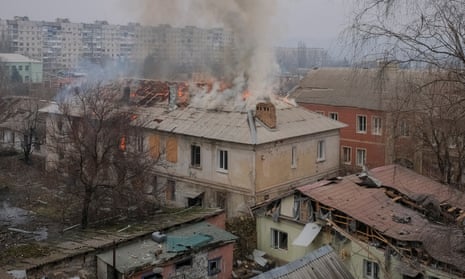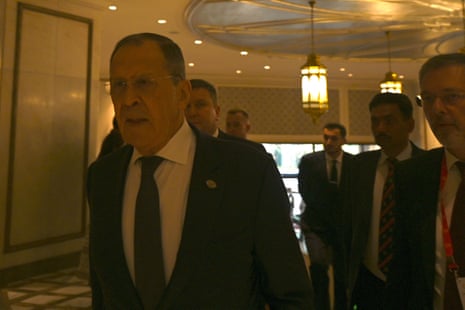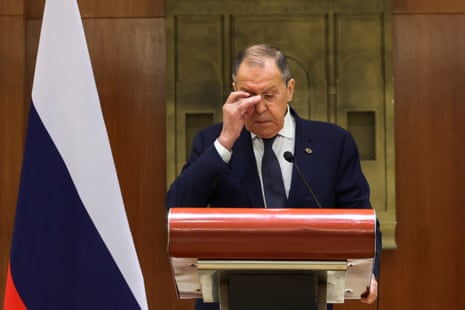Blinken and Lavrov meet for the first time since Russia’s invasion
The US secretary of state, Antony Blinken, and Russia’s foreign minister, Sergei Lavrov, spoke for less than 10 minutes on the margins of the G20 meeting in New Delhi today, according to a US state department official.
Blinken reiterated to Lavrov that Washington was prepared to support Ukraine’s defence for as long as it takes, the official said, in what is believed to be their first one-on-one conversation in person since Russia’s invasion of Ukraine in February 2022.
Blinken also called for Moscow to reverse its decision to suspend participation in the New Start nuclear treaty and to release detained US citizen, Paul Whelan.
The official said:
The secretary saw the purpose of this was to deliver these three direct messages, which we see as advancing our interests.
We always remain hopeful that the Russians will reverse their decision and be prepared to engage in a diplomatic process that can lead to a just and durable peace, but I wouldn’t say that coming out of this encounter there was any expectation that things will change in the near term.
Lavrov did not mention the meeting during a news conference he gave after Thursday’s G20 foreign ministers’ meeting.
Russia’s foreign ministry spokesperson, Maria Zakharova, confirmed the meeting took place, telling CNN:
Blinken asked for contact with Lavrov. On the go, as part of the second session of the [G20], Sergey Viktorovich [Lavrov] talked. There were no negotiations, meetings, etc.
Key events
Serbia’s president, Aleksandar Vučić, has said his country faces “some difficult choices” as he reconsiders its relationship with its traditional Slavic ally, Russia.
In an interview with Politico, Vučić indicated that he believed the time had come to rethink Serbia’s refusal to join western sanctions against Russia. He said:
You’re going to get one sentence from me: Serbia will remain on its EU path. Okay, draw your own conclusions. But I think you understand me.
He added:
We’ll have some difficult choices in the future, no doubt. That’s all I can say.
Vučić reiterated that Russia should halt its efforts to recruit Serbs to fight alongside its Wagner paramilitary group in Ukraine.
The Serbian legislature bans the participation of its citizens in conflicts abroad and several people have been sentenced for doing so.
Serbs who’ve been recruited to fight in Ukraine “are going to be arrested when they come back to Serbia and [are] within reach of our institutions. You don’t recruit like that in a friendly country,” Vučić added.
Serbia is a candidate to join the EU, its main trade partner and investor, but it also maintains trade and military cooperation with Russia, a traditional Slavic and Orthodox Christian ally.
Although it repeatedly condemned Russia’s invasion against Ukraine at the UN and several other international forums, Belgrade has also refused to impose sanctions against Moscow.
A new team of nuclear experts from the International Atomic Energy Agency (IAEA) have taken up its post at the Russian-occupied Zaporizhzhia nuclear power station in southern Ukraine after a delay of almost a month, IAEA chief Rafael Grossi has said.
The “long-delayed” rotation of IAEA allows the three experts who had been at the site since early January to finally begin their journey back to IAEA headquarters.
In a statement, Grossi said the presence of IAEA monitors at the station was “indispensable to help reduce the risk of a nuclear accident”.
He added:
Our courageous experts – working closely with the plant’s operating staff – are providing technical advice and monitoring the situation in extremely difficult and challenging circumstances.
Grossi reiterated his “determination to help protect the plant by agreeing and implementing a nuclear safety and security protection zone there”.
Air raid alerts have been reported across Ukraine, including the capital, Kyiv.
Euan MacDonald of the New Voice of Ukraine has posted a map showing which regions of Ukraine are covered by the air raid alerts, adding that a MiG-31K fighter jet has taken off in Belarus.
Air raid alert in Kyiv, and countrywide. MiG-31K has taken off in Belarus. This aircraft can carry a missile with a range that can reach every part of Ukraine, so the whole country goes on alert when one takes off. pic.twitter.com/e9VQZWvRaO
— Euan MacDonald (@Euan_MacDonald) March 2, 2023
Blinken says he told Lavrov to ‘engage in meaningful diplomacy’
The US secretary of state, Antony Blinken, said he told Russia’s foreign minister, Sergei Lavrov, that Washington would continue to support Ukraine for as long as it took when the pair met briefly on the sidelines of the G20 meeting of foreign ministers in New Delhi.
Blinken said he had told Lavrov that Washington would push for the war in Ukraine to end through diplomatic terms that Kyiv agreed to.
“End this war of aggression, engage in meaningful diplomacy that can produce a just and durable peace,” Blinken said he had told the Russian foreign minister. He added:
President Putin has demonstrated zero interest in engaging, saying there’s nothing to even talk about unless and until Ukraine accepts and I quote ‘the new territorial reality’.
Blinken said he had also urged Moscow to reconsider its “irresponsible decision” and return to participation in the New Start nuclear treaty, and that he had told Lavrov that “mutual compliance is in the interest of both our countries”.
He added:
No matter what else is happening in the world, in our relationship, the United States is always ready to engage and act on strategic arms control, just as the United States and the Soviet Union did even at the height of the cold war.
He said he had also urged Russia to release the detained US citizen Paul Whelan, and Washington had “put forward a serious proposal. Russia should take it.”
Summary of the day so far
It’s 6pm in Kyiv. Here’s where we stand:
-
A meeting of top diplomats from the Group of 20 (G20) industrialised and developing nations in New Delhi has ended with no consensus on the war in Ukraine. Most G20 members strongly condemned the Ukraine war, with Russia and China disagreeing, said the G20 president, India, after the meeting. India’s foreign minister, Subrahmanyam Jaishankar, said there were “divergences” on the issue of the war in Ukraine “which we could not reconcile as various parties held differing views”.
-
The US secretary of state, Antony Blinken, and Russia’s foreign minister, Sergei Lavrov, spoke for less than 10 minutes on the margins of the G20 meeting in New Delhi today, according to a US state department official. Blinken reiterated to Lavrov that Washington was prepared to support Ukraine’s defence for as long as it took, the official said, in what is believed to be their first one-on-one conversation in person since Russia’s invasion of Ukraine in February 2022.
-
Ukrainian forces are hanging on to their positions in the ruined eastern city of Bakhmut under constant attack from Russian troops. Russia says seizing Bakhmut would open the way to fully controlling the rest of the strategic Donbas industrial region bordering Russia, one of the main objectives of the invasion it launched on 24 February 2022. Ukraine says Bakhmut has limited strategic value but has put up fierce resistance. “I believe that, sooner or later, we will probably have to leave Bakhmut. There is no sense in holding it at any cost,” the Ukrainian member of parliament Serhiy Rakhmanin said on NV radio late on Wednesday.
-
Russia attacked a five-storey residential block in Zaporizhzhia overnight, killing four people and injuring eight others. The Zaporizhzhia regional military administration said Russia appeared to have used a S-300 missile for the strike. A spokesperson for Russian proxies in the partially occupied region, which the Russian Federation claims to have annexed, said – without producing any evidence – that the strike was the result of the actions of Ukrainian air defences.
-
The Kremlin claimed Russia had been attacked by “terrorists” after conflicting reports of firefights emerged from the Bryansk and Kursk regions, which Russian media blamed on Ukrainian “sabotage groups”. The reports of fighting in Russia near the Ukrainian border began on Thursday morning. The head of the Bryansk region claimed that a “sabotage group opened fire on a moving automobile. As a result, one resident was killed; a 10-year-old child was injured.”
-
In Ukraine, the reports were quickly interpreted as a “false flag” attack launched by Russia to discredit the Ukrainian armed forces. “The story about [the Ukrainian] sabotage group in [Russia] is a classic deliberate provocation,” wrote Mykhailo Podolyak, a Ukrainian presidential adviser. There was no immediate video or photo of the fighting to confirm the reports of deaths.
-
Vladimir Putin planned to hold a meeting of the security council, Russia’s main military decision-making body, on Friday, Kremlin spokesperson Dmitry Peskov said. Peskov said he had also cancelled a trip to Stavropol.
-
The German chancellor, Olaf Scholz, has urged China not to send weapons to help Russia’s war in Ukraine, and instead asked Beijing to exert pressure on Moscow to pull back its forces. In a speech to the German parliament, Scholz said it was disappointing that Beijing had refrained from condemning the Russian invasion, though he welcomed its efforts towards nuclear de-escalation.
-
Evidence collected from Kherson in southern Ukraine shows Russian torture centres were not “random” but instead planned and directly financed by the Russian state, according to a team of Ukrainian and international lawyers headed by a UK barrister. The lawyers, called the Mobile Justice Team, said on Thursday they had investigated 20 torture chambers in Kherson and concluded they were part of a “calculated plan to terrorise, subjugate and eliminate Ukrainian resistance and destroy Ukrainian identity”.
-
The Little Mermaid statue in Copenhagen, one of Denmark’s most notable landmarks, has been vandalised, with a Russian flag painted across its base. Copenhagen police said they had attended the scene and recorded “a case of vandalism” and that they were trying to find “traces” in the area. An investigation has been opened into the act, seen as a sign of support for Moscow in the war in Ukraine.
Good afternoon from London, it’s Léonie Chao-Fong still here with all the latest from the Russia-Ukraine war. Feel free to get in touch on Twitter or via email.

Peter Beaumont
In the besieged city of Bakhmut in eastern Ukraine, the volunteers collecting the civilian dead risk becoming casualties themselves.
“Where? Where?” demands Daniel Wilk, a Canadian driver, in shaky video footage shot recently inside the city and seen by the Guardian.
Wilk proceeds quickly, the anxiety of the situation visible in his movements as he is directed to a fence, cutting an uncertain path across the snow as another voice cries “no, no” repeatedly.
The bodies, when Wilk gets to them, have been cut in half by the force of the explosion that took their lives, and still lie where they fell three days before. Quickly they are bundled up in a sheet to be removed.
People who have managed to reach Bakhmut in the past week use the same word to describe what they have experienced: hell.

As flames and smoke ring into the sky from blazing buildings, the city, almost totally encircled by Russian forces, has been raked by constant gunfire and explosions in recent days. With roads leading to the city under constant fire from two sides, and with snipers in the streets, accessing the city has become ever more perilous for rescue teams, as speculation has mounted that Ukrainian forces will have to withdraw.
“We haven’t been able to reach the downtown area in recent days,” said Olha Danilova, who like Wilk works for a Ukrainian NGO, Dobryi Rukh, which has been working in Bakhmut for all of the seven months of the Russian assault.
The closest we could get was 500 metres from the city centre. It’s very loud. Everything is being shelled with mortars. It’s inaccessible. We were trying evacuate civilian from down by the river last time. We couldn’t even get close.
The main road we used to use is being shelled constantly. The 27th [of February] was the worst. That was the hell day. It was the hardest day we’ve had since we’ve been working here. It was a wall of fire. Two walls of fire. It was coming from all sides, and aviation was attacking.
Read the full report by Peter Beaumont:
Poland and Ukraine have called for international sanctions against Russia’s nuclear energy sector, after the EU adopted its latest package of sanctions that did not include Moscow’s nuclear energy sector because of opposition from some EU member states.
“If we want to develop nuclear … we need to suspend Russia in International Atomic Energy Agency (IAEA),” Poland’s climate and environment minister, Anna Moskwa, said at an energy conference in the Croatian capital of Zagreb.
We need to end any nuclear cooperation with Russia … and I believe Europe will manage to do so. Nuclear sanctions next package – this is our future challenge we need to face no matter how difficult it is.
She said Russia’s occupation of the Zaporizhzhia nuclear power in southern Ukraine was a “very huge danger to our economies, to our society, to our security”.
“We should get rid of Russians in the nuclear sector, in a civilised world they cannot be present as a partner of business,” Ukraine’s energy minister, German Galushchenko, said at the same conference. He added:
They destroy everything, they destroy all seven pillars of nuclear safety and security.
Reuters has a quick snap from the sidelines of the G20 meeting that US secretary of state Antony Blinken claims to have told Russian foreign minister Sergei Lavrov that whatever else was happening in the world, the US was always ready to engage with Russia on the issue of strategic arms control.
Blinken and Lavrov met briefly in New Delhi, according to US officials, in what would have been their first face-to-face meeting since Russia’s latest invasion of Ukraine commenced in February 2022. Last Tuesday, Russia’s president, Vladimir Putin, said his country would halt its participation in the New Start nuclear arms treaty.
Moldova’s parliament adopted a declaration on Thursday condemning the Russian invasion of Ukraine which has contributed to a rise in tensions between Moscow and Chișinău.
A narrow majority of 55 lawmakers in the 101-seat assembly voted for the declaration, which stated that Moscow’s invasion began with the seizure of the Crimea peninsula in February 2014 and demanded the withdrawal of all Russian troops from Ukraine.
Reuters reports the declaration said Russia was waging an illegal, unprovoked and unfounded war of aggression in Ukraine that violated the principles of international law, and echoed calls by Kyiv for an international tribunal to prosecute war crimes.
Tensions between Russia and Moldova, the small former Soviet republic which borders Ukraine, have grown sharply since the war began.
Moldova has protested to Moscow that Russian missiles aimed at Ukraine have entered its airspace and that missile debris has landed inside its borders, and it has accused Moscow of plotting to topple the pro-European government in Chișinău.
Russia has denied the allegation and accused Ukraine and other countries of stoking instability in Moldova’s breakaway Transdniestria region, where about 1,500 Russian troops are based. Chișinău and Kyiv have dismissed the accusation.
The Guardian’s Peter Beaumont reports seeing an increase in the number of people claiming that images from Ukraine are fake.
He writes that it is his fifth trip to Ukraine and his sense of outrage is only getting stronger. “Listen to the people who are here,” he adds.
I’ve been seeing an increasing amount of crap from western pro-Putin keyboard warriors about how images from Ukraine are somehow fake. This is my fifth trip and the horror of what I’m seeing and my sense of outrage is only getting stronger. Listen to the people who are here.
— petersbeaumont (@petersbeaumont1) March 2, 2023

Andrew Roth
In Ukraine, the reports of firefights emerged from the Bryansk and Kursk regions were quickly interpreted as a “false flag” attack launched by Russia to discredit the Ukrainian armed forces.
“The story about [the Ukrainian] sabotage group in [Russia] is a classic deliberate provocation,” wrote Mykhailo Podolyak, a Ukrainian presidential adviser.
[Russia] wants to scare its people to justify the attack on another country and the growing poverty after the year of war. The partisan movement in [Russia] is getting stronger and more aggressive. Fear your partisans …
The story about 🇺🇦sabotage group in RF is a classic deliberate provocation. RF wants to scare its people to justify the attack on another country & the growing poverty after the year of war. The partisan movement in RF is getting stronger & more aggressive. Fear your partisans…
— Михайло Подоляк (@Podolyak_M) March 2, 2023
Russia blames Ukrainian ‘terrorists’ after reports of fighting near Ukraine border

Andrew Roth
The Kremlin claimed Russia had been attacked by “terrorists” after conflicting reports of fighting emerged from the Bryansk and Kursk regions, which Russian media blamed on Ukrainian “sabotage groups” and Ukrainian sources called a “provocation”.
The reports of fighting in Russia near the Ukrainian border began on Thursday morning. The head of the Bryansk region claimed that a “sabotage group opened fire on a moving automobile. As a result, one resident was killed; a 10-year-old child was injured.”
Other reports of hostages being taken or school buses being fired upon have been discredited, even by local Russian officials. In an online statement later corroborated by the independent Russian news site iStories, a group called the Russian Volunteer Corps claimed its fighters had crossed the border into Russia on Thursday but denied reports of civilian casualties.
The reports of the attack set off a flurry of activity in the Kremlin and at Russia’s security services. Russia’s FSB security service claimed it had launched an operation “to destroy armed Ukrainian nationalists who violated the state border”.
Kremlin spokesperson Dmitry Peskov said the president, Vladimir Putin, would plan to hold a meeting of the security council, Russia’s main military decision-making body, on Friday. Peskov said he had also cancelled a trip to Stavropol.
He said:
We are talking about a terrorist attack. Measures are being taken to eliminate them.
Asked whether Russia could change the status of its “special military operation” after the reported attacks, Peskov said:
I don’t know. I can’t say for now.
Russia’s foreign minister, Sergei Lavrov, has been pictured in New Delhi where he is attending a meeting of top diplomats from the G20 countries.



